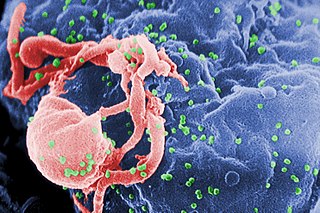
The human immunodeficiency viruses (HIV) are two species of Lentivirus that infect humans. Over time, they cause acquired immunodeficiency syndrome (AIDS), a condition in which progressive failure of the immune system allows life-threatening opportunistic infections and cancers to thrive. Without treatment, the average survival time after infection with HIV is estimated to be 9 to 11 years, depending on the HIV subtype.

Scottish Gaelic, also known as Scots Gaelic or simply Gaelic, is a Goidelic language native to the Gaels of Scotland. As a Goidelic language, Scottish Gaelic, as well as both Irish and Manx, developed out of Old Irish, and it remains, to a degree, mutually intelligible with Irish. It became a distinct spoken language sometime in the 13th century in the Middle Irish period, although a common literary language was shared by the Gaels of both Ireland and Scotland until well into the 17th century. Most of modern Scotland was once Gaelic-speaking, as evidenced especially by Gaelic-language place names.

The Highlands is a historical region of Scotland. Culturally, the Highlands and the Lowlands diverged from the Late Middle Ages into the modern period, when Lowland Scots language replaced Scottish Gaelic throughout most of the Lowlands. The term is also used for the area north and west of the Highland Boundary Fault, although the exact boundaries are not clearly defined, particularly to the east. The Great Glen divides the Grampian Mountains to the southeast from the Northwest Highlands. The Scottish Gaelic name of A' Ghàidhealtachd literally means "the place of the Gaels" and traditionally, from a Gaelic-speaking point of view, includes both the Western Isles and the Highlands.
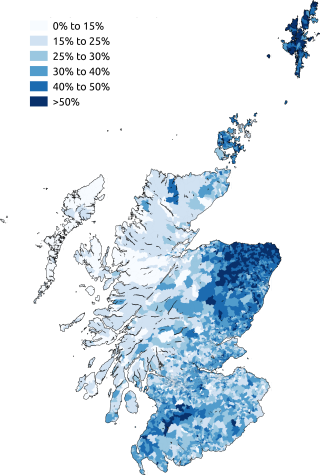
Scots is a language variety descended from Early Middle English in the West Germanic language family. Most commonly spoken in the Scottish Lowlands, the Northern Isles of Scotland, and northern Ulster in Ireland, it is sometimes called: Lowland Scots, to distinguish it from Scottish Gaelic, the Celtic language that was historically restricted to most of the Scottish Highlands, the Hebrides, and Galloway after the sixteenth century; or Broad Scots, to distinguish it from Scottish Standard English. Modern Scots is a sister language of Modern English, as the two diverged from the same medieval form of English.
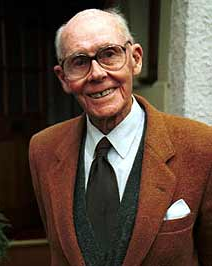
Nigel Tranter OBE was a writer of a wide range of books on history and architecture, both fiction and non-fiction. He was best-known for his popular and well-researched historical novels, covering centuries of Scottish history.
The Glasgow dialect, also called Glaswegian, varies from Scottish English at one end of a bipolar linguistic continuum to the local dialect of West Central Scots at the other. Therefore, the speech of many Glaswegians can draw on a "continuum between fully localised and fully standardised". Additionally, the Glasgow dialect has Highland English and Hiberno-English influences owing to the speech of Highlanders and Irish people who migrated in large numbers to the Glasgow area in the 19th and early 20th centuries. While being named for Glasgow, the accent is typical for natives across the full Greater Glasgow area and associated counties such as Lanarkshire, Renfrewshire, Dunbartonshire and parts of Ayrshire, which formerly came under the single authority of Strathclyde. It is most common in working class people, which can lead to stigma from members of other classes or those outside Glasgow.
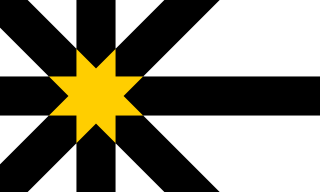
Sutherland is a historic county, registration county and lieutenancy area in the Highlands of Scotland. The name dates from the Viking era when the area was ruled by the Jarl of Orkney; although Sutherland includes some of the northernmost land on the island of Great Britain, it was called Suðrland from the standpoint of Orkney and Caithness.
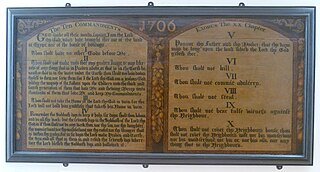
Kirk is a Scottish and former Northern English word meaning 'church'. The term the Kirk is often used informally to refer specifically to the Church of Scotland, the Scottish national church that developed from the 16th-century Reformation. Many place names and personal names are derived from kirk.

The history of the Scots language refers to how Anglic varieties spoken in parts of Scotland developed into modern Scots.

The Gàidhealtachd usually refers to the Highlands and Islands of Scotland and especially the Scottish Gaelic-speaking culture of the area. The similar Irish language word Gaeltacht refers, however, solely to Irish-speaking areas.
Matthew Fitt is a Scots poet and novelist. He was writer-in-residence at Greater Pollok in Glasgow, then National Scots Language Development Officer. He has translated several literary works into Scots.

Lochearnhead is a village in Perthshire on the A84 Stirling to Crianlarich road at the foot of Glen Ogle, 14 miles north of the Highland Boundary Fault. It is situated at the western end of Loch Earn where the A85 road from Crieff meets the A84.
James Robertson is a Scottish writer who is the author of several novels, short stories and poetry collections. Robertson was born in Sevenoaks, England but grew up in Bridge of Allan, Stirlingshire. He has published seven novels: The Fanatic, Joseph Knight, The Testament of Gideon Mack, And the Land Lay Still, The Professor of Truth, and To Be Continued… and News of the Dead. The Testament of Gideon Mack was long-listed for the 2006 Man Booker Prize.

The languages of Scotland belong predominantly to the Germanic and Celtic language families. The main language now spoken in Scotland is English, while Scots and Scottish Gaelic are minority languages. The dialect of English spoken in Scotland is referred to as Scottish English.
Kidnapped, a 2007 graphic novel by Alan Grant (words) and Cam Kennedy (artwork), is adapted from Robert Louis Stevenson's 1886 novel Kidnapped. It was commissioned as part of the events to celebrate Edinburgh being named the first UNESCO City of Literature.

A virus is a submicroscopic infectious agent that replicates only inside the living cells of an organism. Viruses infect all life forms, from animals and plants to microorganisms, including bacteria and archaea. Viruses are found in almost every ecosystem on Earth and are the most numerous type of biological entity. Since Dmitri Ivanovsky's 1892 article describing a non-bacterial pathogen infecting tobacco plants and the discovery of the tobacco mosaic virus by Martinus Beijerinck in 1898, more than 11,000 of the millions of virus species have been described in detail. The study of viruses is known as virology, a subspeciality of microbiology.

The Kingdom of Scotland was a sovereign state in northwest Europe, traditionally said to have been founded in 843. Its territories expanded and shrank, but it came to occupy the northern third of the island of Great Britain, sharing a land border to the south with the Kingdom of England. During the Middle Ages, Scotland engaged in intermittent conflict with England, most prominently the Wars of Scottish Independence, which saw the Scots assert their independence from the English. Following the annexation of the Hebrides and the Northern Isles from Norway in 1266 and 1472 respectively, and the capture of Berwick by England in 1482, the territory of the Kingdom of Scotland corresponded to that of modern-day Scotland, bounded by the North Sea to the east, the Atlantic Ocean to the north and west, and the North Channel and Irish Sea to the southwest.

The Scottish people or Scots are an ethnic group and nation native to Scotland. Historically, they emerged in the early Middle Ages from an amalgamation of two Celtic peoples, the Picts and Gaels, who founded the Kingdom of Scotland in the 9th century. In the following two centuries, Celtic-speaking Cumbrians of Strathclyde and Germanic-speaking Angles of Northumbria became part of Scotland. In the High Middle Ages, during the 12th-century Davidian Revolution, small numbers of Norman nobles migrated to the Lowlands. In the 13th century, the Norse-Gaels of the Western Isles became part of Scotland, followed by the Norse of the Northern Isles in the 15th century.
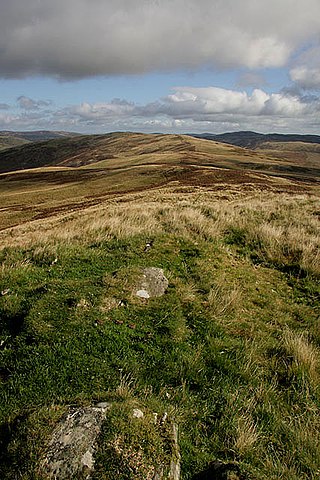
The geography of Scotland in the early modern era covers all aspects of the land in Scotland, including physical and human, between the sixteenth century and the beginnings of the Agricultural Revolution and industrialisation in the eighteenth century. The defining factor in the geography of Scotland is the distinction between the Highlands and Islands in the north and west and the Lowlands in the south and east. The Highlands were subdivided by the Great Glen and the Lowlands into the fertile Central Lowlands and the Southern Uplands. The Uplands and Highlands had a relatively short growing season, exacerbated by the Little Ice Age, which peaked towards the end of the seventeenth century.
William "Bill" Fleming Hoggan Jarrett (1928–2011) was a British pathologist.














